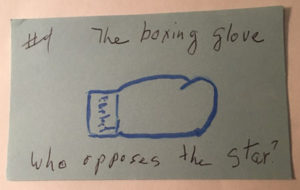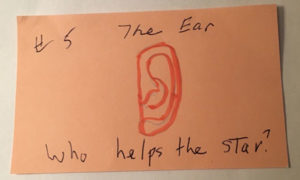The cards for today are two important characters in your future novel, one opposed to the protagonist and the other allied, more or less . . .

Card # 4
The Boxing Glove
The Boxing Glove Card asks the question,
“Who will oppose the star of the story?”
Card # 4, the boxing glove, asks the question, “Who will oppose the protagonist as she attempts to reach the goal?” That is, who’s the antagonist of your novel? And why does the antagonist oppose the protagonist? In other words, who’s the bad guy or gal? And why?
(Actually, it’s more fun for you and your eventual reader if the antagonist has some redeeming virtues or at least is interesting.)
You can call him the villain if you like although your antagonist might have a perfectly logical reason for his despicable actions, or at least they make sense to him. For example, in January Jinx, the first novel in my Calendar Mystery series, the ignorant, so-called sheriff of Campbell, Kansas, messes with the protagonist’s goal of finding a job because he thinks he can extort a bunch of money from her.
It’s not uncommon for a novice novelist to let the antagonist drive the plot car from the start and just keep on doing that until the plot car runs right off the road. The protagonist and the antagonist should be worthy of each other. And often the antagonist seems to be winning at the start of the novel. But sooner or later she probably should get her come-uppance.
Personally, I don’t read lots of horror fiction, but I have read Stephen King’s Misery. It has a superb yet terrifying antagonist, Annie Wilkes, who proclaims herself to be novelist Paul Sheldon’s “number one fan.” She is a really scary woman, that’s for sure, and she does many bad things to the author, including forcing him to write another sappy novel in his sappy series. But eventually Paul wins out though he’s left physically and mentally scarred.
Note: The antagonist doesn’t have to be human. It can be a force of nature like the ocean in Ernest Hemingway’s The Old Man and the Sea.

Card # 5
The Ear
The Ear Card asks the question,
“Who helps the star?”
This is one of my favorites. Your protagonist needs an ally, that is, someone to talk to, aka a confidant–for a very practical reason. What’s that? you ask. Answer: so you can have dialogue. Fiction needs dialogue, that is, people talking, for it to come alive and jump up off the page. Also, with dialogue comes the ability to have conflict, the essence of what fiction is about.
I once had a student who didn’t like to write dialogue, so she arranged for the protagonist of her science fiction novel not to understand a word of what other characters, members of an alien race, said. Gosh, that novel was dead in the water, and after a while I refused to read any more of it.
But I’ve gotten way ahead of myself. Suffice it to say you need to give the star of your novel someone to help him or her. At the very least, the ally can help the protagonist achieve the goals of the book by listening to the main character, that is, by serving as the protagonist’s confidant.
You can have lots of fun with the ally since there are so many possibilities for this character besides providing someone to talk to. The ally can serve as the foil to the protagonist, for instance, the lippy girlfriend who’s temperamentally very different from the serious female protagonist. The ally can be the comic relief sidekick. You can even let the ally oppose the protagonist sometimes by putting her down or by expressing doubts about his ability to make a million bucks.
Think about how interesting The Silence of the Lambs became when Thomas Harris made the loathsome cannibal Hannibal Lecter Clarice Starling’s ally by giving her information that ultimately helped her find the killer.
P. S. If you want a faster pace, you can order your eBook version of Novel Basics for only $2.99 at http://www.amazon.com/dp/B07K2LXFRP
